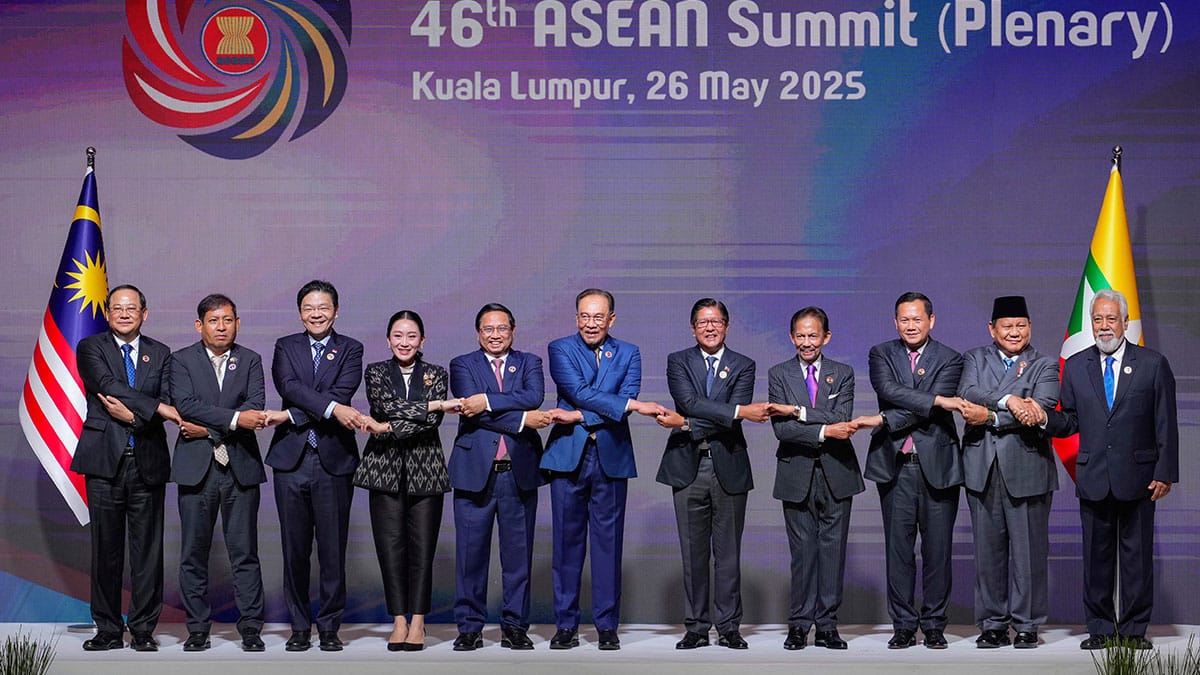PH hopeful Asean, China to adopt South China Sea code of conduct in 2026

ASEAN leaders chain their hands while posing for a picture before the start of the plenary session at the Association of Southeast Asian Nations (ASEAN) Summit in Kuala Lumpur, Malaysia, Monday, May 26, 2025. From left to right, Laos’s Prime Minister Sonexay Siphandone, Myanmar Permanent Secretary of the Ministry of Foreign Affairs Aung Kyaw Moe, Singapore’s Prime Minister Lawrence Wong, Thailand’s Prime Minister Paetongtarn Shinawatra, Vietnam’s Prime Minister Pham Minh Chinh, Malaysia’s Prime Minister Anwar Ibrahim, Philippine’s President Ferdinand Marcos Jr., Brunei’s Sultan Hassanal Bolkiah, Cambodian Prime Minister Hun Manet, Indonesia’s President Prabowo Subianto and East Timor’s Prime Minister Xanana Gusmao. —AP Photo/Vincent Thian
The President will push the agenda in 2026 when Manila hosts the Asean Summit meetings, saying the CoC would pave the way for the peaceful resolution of overlapping territorial disputes in the region.
“We will certainly try because it is very, very important,” Marcos said in the final part of the third episode of his podcast aired on Friday.
He was asked what bigger and more concrete steps his administration could do to advance the conclusion of the CoC.
“When that happens, it will be clear what the rules are for everyone, not just the Philippines,” the President said.
“Every nation around the South China Sea can say that—no more of this, no more of that, no more of a collision, no more of building new islands—which was the intention of the original code of conduct. It (the CoC) will make it very clear of what is expected of each signatory country, he added.
For Marcos, the CoC would make things “a bit easier” for countries around the South China Sea. More so for the Philippines, whose West Philippine Sea—a part of the South China Sea which is within the exclusive economic zone of Manila — remains a flashpoint of armed conflict in the region.
READ: Expert scores ‘new level’ of Chinese aggression
In 2002, the Asean and China signed the Declaration on the Conduct of Parties in the South China Sea (DoC) that promises to “enhance favorable conditions for a peaceful and durable solution of differences and disputes among countries concerned.”
Decades on however, claimant countries have not arrived at a solution for any of the dispute, with coercive and provocative acts racked up into serious tensions.
Countries, especially the Philippines, have since pushed for a CoC not only to overcome the DoC’s weaknesses but also address new challenges since 2002.
In the case of the Philippines, the DoC did not stop China from seizing control of Ayungin (Second Thomas) Shoal in 2012 after a tense standoff with the Philippine Navy.
The Philippines in 2013 brought an arbitral case against China before the Permanent Court of Arbitration in the Hague, Netherlands.
Three years later, the international tribunal upheld the Philippines’ sovereign rights to fish and exploit resources within its 370-kilometer exclusive economic zone and rejected China’s sweeping claims over practically the entire South China Sea.
Beijing, however, has refused to acknowledge the ruling, claiming it has sufficient historical and jurisprudential basis.
Apart from the Philippines and China, other Asean members Vietnam, Malaysia and Brunei also have overlapping claims over the South China Sea.
Major conflict
Since the start of the Marcos administration in 2022, the Philippines has called on Asean members and China about the need to expedite the adoption of the CoC to prevent a major conflict in the South China Sea.
“We underscore the urgent need to accelerate the adoption of a legally binding code of conduct on the South China Sea. This is to safeguard maritime rights, promote stability, and prevent miscalculations at sea,” President Marcos said during a plenary session of the 46th Asean summit in Malaysia in May.
The President also clarified that there is no change in the Philippines’ position in asserting its sovereignty in the West Philippine Sea.
This was after Marcos said in his fourth State of the Nation Address (Sona) that the foreign policy of the Philippines shall be “a friend to all, and an enemy to none.”
READ: Marcos: PH confident with allies, but foreign policy still independent
In his first Sona in 2022, President Marcos underscored that his government would never give up a single inch of its territory to foreign aggressors.
“There is no shift in tone,” he said. “It did not change because continuing to defend strongly our territory is not mutually exclusive from being a friend to all and an enemy of none.”
“We are not fighting with anyone. We treat everyone as our friend but we will assert the Philippines’ sovereignty. We will fight for our territory. You can do both, you don’t have to choose one or the other,” the President explained.
Open lines
Marcos also underscored the need to maintain an open line of communication with other claimant countries.
The President made the response when asked about criticisms that Manila resorted to filing diplomatic protests as response to Beijing’s dangerous maneuvers and harassment of local fishermen and government personnel in the West Philippine Sea, only for China to repeat its actions.
“We can only control what we do. We cannot control what other countries do,” he admitted.
The government keeps its lines of communication always open, the President said: “Because once these are closed, then there is no room for improvement.”
“Some will allege that it is useless, but we have to keep on trying. But we cannot just shut it down. If we do so, it will only worsen the situation,” he added. /cb


















